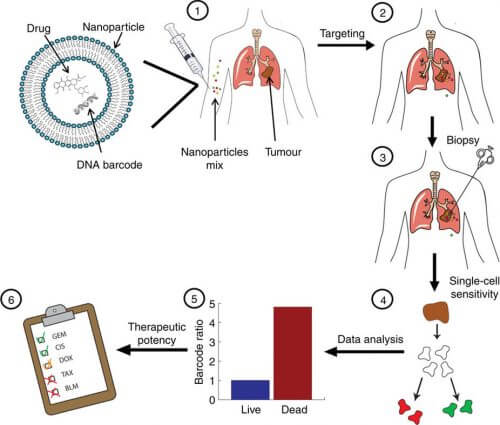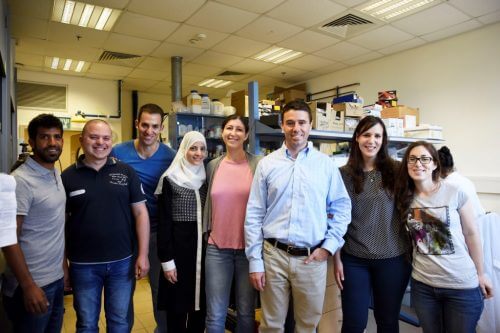Researchers at the Technion have developed an innovative technology for customizing an anti-cancer drug to the patient. In this process, which is similar to an allergy test, tiny amounts of different drugs are tested inside the cancerous tumor in the patient's body. The research was led by Prof. Avi Schroeder from the Faculty of Chemical Engineering.

Researchers at the Technion have developed a new diagnostic technology for early testing of the suitability of an anti-cancer drug for the specific patient, even before the start of the series of treatments. The research, which was published in Nature Communications, was led by Associate Professor Avi Schroeder from the Faculty of Chemical Engineering at the Technion. The research was funded by the prestigious ERC-H2020 grant from the European Union as well as by the National Science Foundation
and the Cancer Society.
"The world of medicine is currently moving to personalized medicine," explains Prof. Schroeder. This is a paradigmatic change resulting from the enormous development in the understanding of the human genome and the understanding that different people react in different ways to the same treatment. However, even the treatments adapted to the genetic characteristics of the patient sometimes do not provide the complete picture about the patient, when choosing the appropriate medicine. In fact, many of the patients receive a drug to which the cancer does not respond. This is the background for our research, within the framework of which we developed a technology that overcomes this obstacle."
Prof. Schroeder, doctoral student Zvi Yaari and other researchers in the research team have developed a kind of tiny (and safe) laboratory that tests the effectiveness of the specific drug in the body of the specific patient. "It is somewhat reminiscent of allergy tests, which provide us with a simple test the allergy profile of the specific person. Here we are talking about a simple test that provides, similarly, the The patient's response profile to the intended drug. This method makes it possible to examine the effectiveness of several drugs at the same time within the patient's cancerous tumor, in minimal doses which are not felt by the patient and do not endanger him at all. Based on this test, the most effective medicine will be chosen for the specific patient."
How do you do that? "We pack tiny amounts of the anti-cancer drugs inside dedicated nanoparticles that we have developed. The uniqueness of these nanometer packages is that they flow in the bloodstream to the tumor and are there swallowed by the cancer cells. We attach artificial DNA sequences to these packages in advance, which serve as barcode readers of the drug's activity in the cancer cells."
After 48 hours, a sample (biopsy) is taken from the tumor, and the barcode analysis provides accurate information on the cells that were destroyed (or not) by each drug. "In other words, this system monitors the effect of each drug on the patient's tumor cells. At the moment we are working with drugs registered as anti-cancer, but in principle it is possible to test a battery of drugs for each patient and thus find out which drug is the most suitable for him for the disease he is suffering from."

The current study, which was based on experiments in mice, focused on the effect of various drugs on triple negative breast cancer - a particularly challenging type of cancer, which does not respond well to standard treatments and makes it difficult for doctors to match the drug to the patient. To make sure that the experiment is indeed testing the effect of the drug itself, and not a possible effect of the nanometer case itself, "placebo packages" empty of the drug were also inserted into the tumors. The result: the anti-cancer drugs were found at the end of the process mainly in dead cancer cells - that is, they killed them - while the placebo packages were found mainly in living cells of the tumor, that is, they did not destroy the cells. When comparing the different anticancer drugs, differences were also found in the effectiveness of the different drugs.
"This technology gives a new window to basic insights into the mechanisms of cancer and its resistance to various drugs," says Prof. Schroeder, "but my thought is also applied: how our research can help people. Therefore the current success is very happy and exciting. It is true that a lot more work is required to make our development a product available to the public, but I believe that in a few years we will see it in the clinic."
Prof. Schroeder is a faculty member in the Technion Faculty of Chemical Engineering and a member of the Russell Berry Nanotechnology Institute (RBNI) and the Technion Integrated Cancer Research Center (TICC). In recent years, Prof. Schroeder has become one of the most prominent scientific entrepreneurs in the field of Israeli biotech, and his research at the Technion formed the basis for the establishment of many companies, including ViAqua Therapeutics, which develops vaccines for aquaculture; InPlant Technologies - a company that improves the quality of the environment and the efficiency and safety of sprays in precision agriculture; PEEL Therapeutics - an American company that develops innovative drugs for the treatment of cancer, based on the unique P53 intracellular control system present in elephants; and Moebius Medical, which developed an innovative treatment for the degenerative joint disease osteoarthritis. The innovative technology that was developed was registered as a patent and these days there are negotiations for commercialization with the venture capital fund NGT3.
The CEO of the Cancer Society, Miri Ziv, said: "We are proud to have contributed to such an important and promising study that may provide a personalized response to patients and lead to more efficient and accurate treatment. We have an excellent long-standing relationship with the Technion on these issues. Research Prof. Aharon Chachanover, winner of the Nobel Prize in Chemistry for 2004, also benefited from the association's research grants at the beginning of his career as a young researcher. Prof. Chachanover served voluntarily as a member of the association's research committee for a decade, and currently serves as our honorary president."
